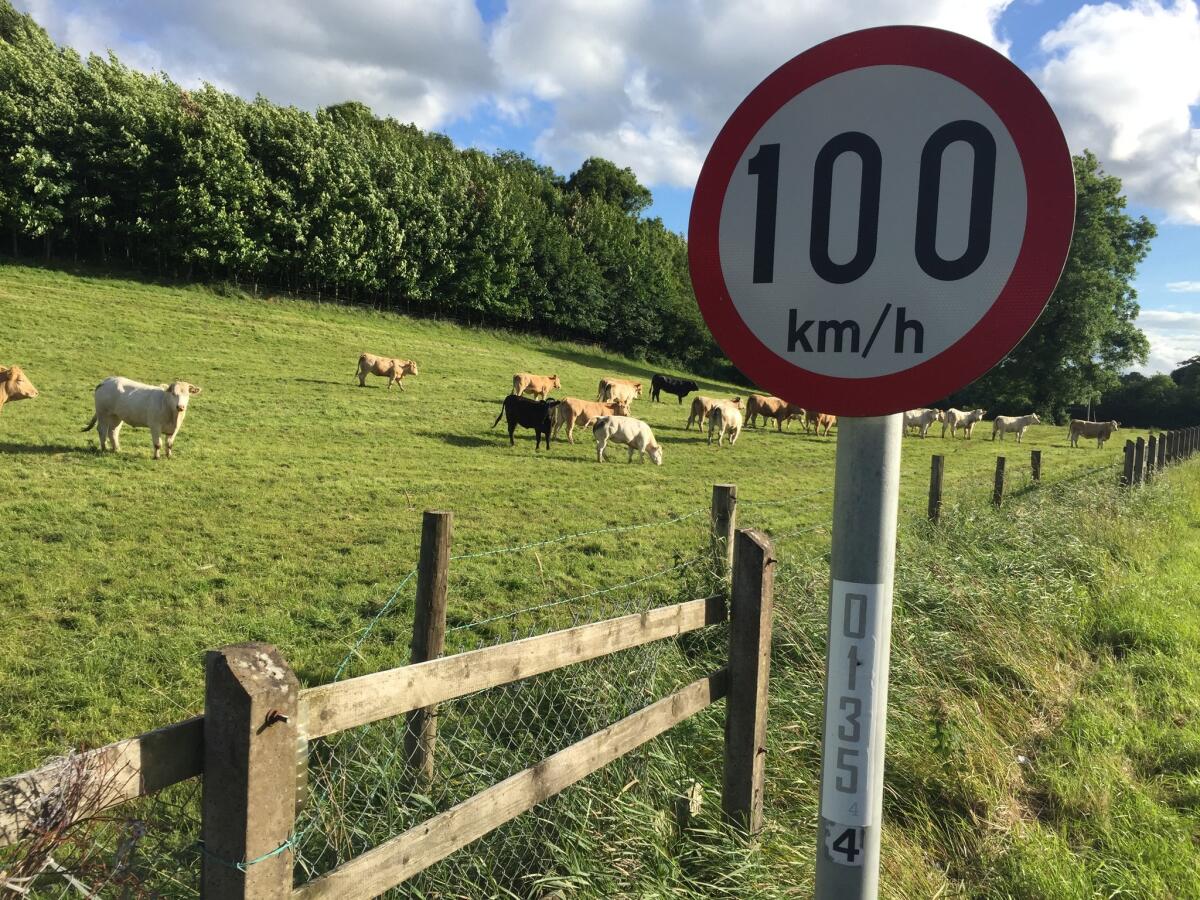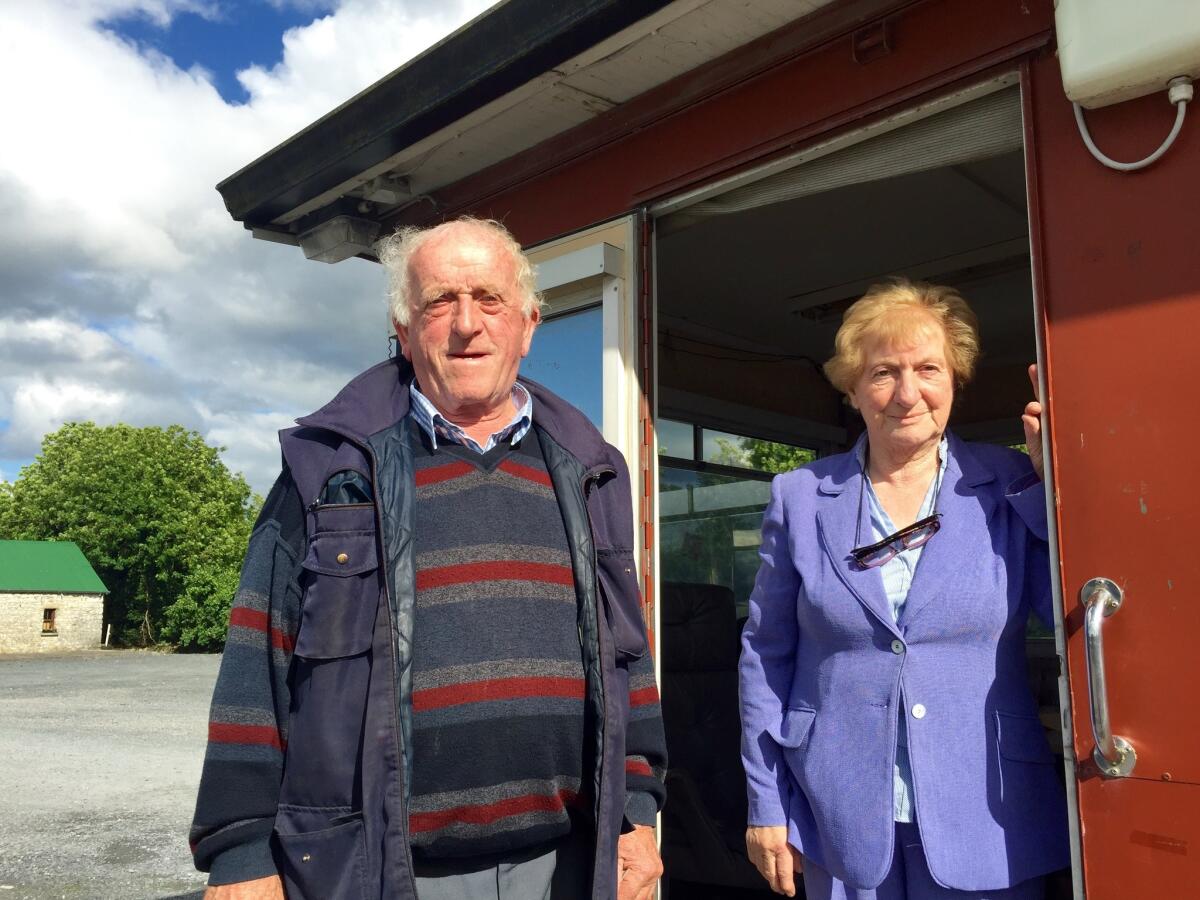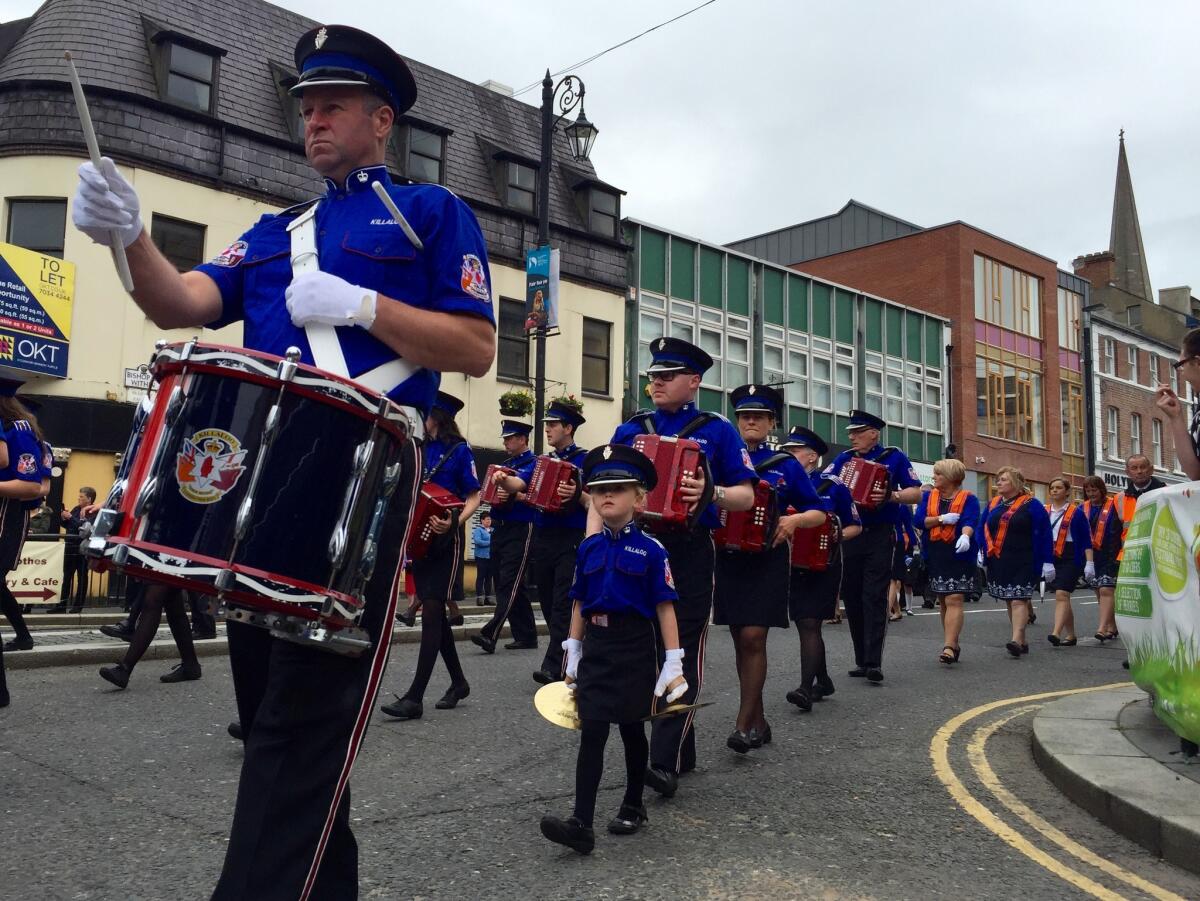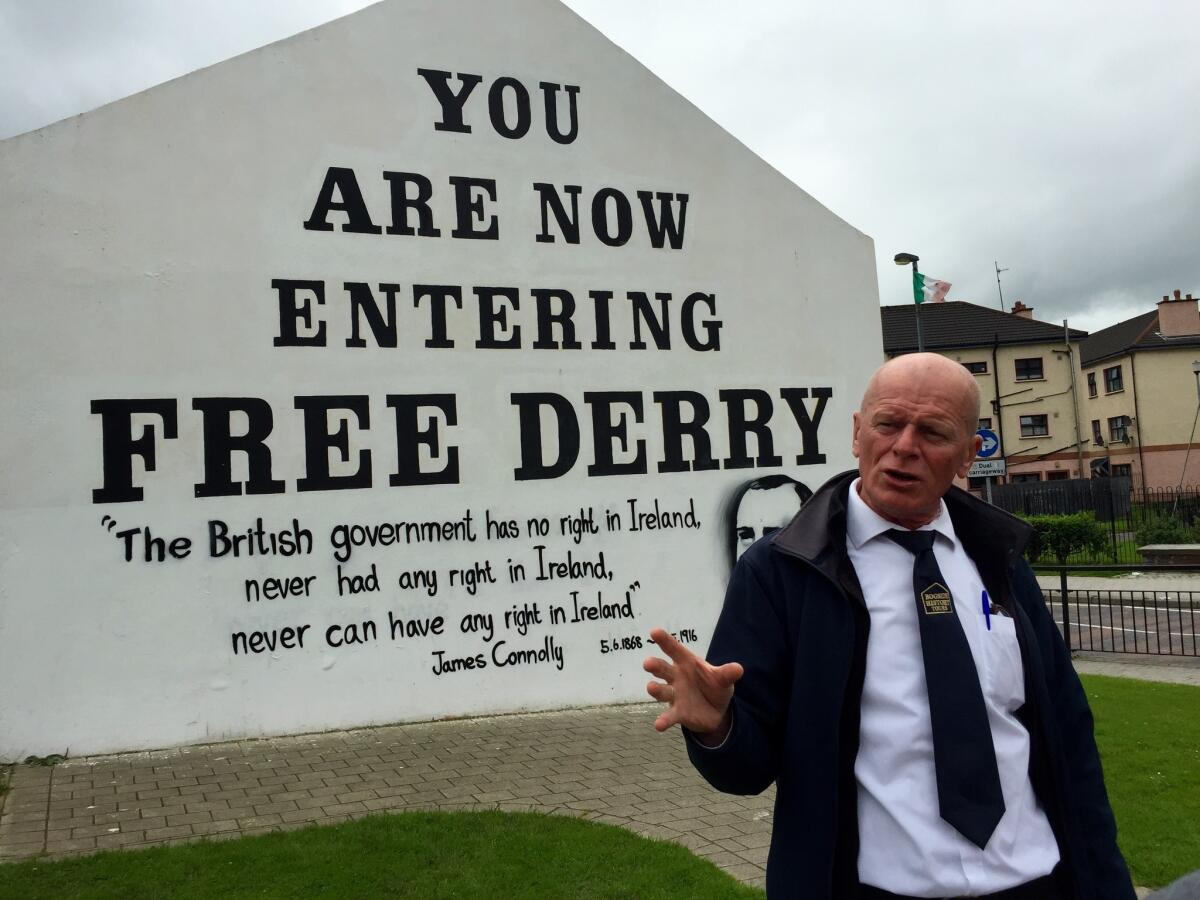Unease along the open border of Northern Ireland and Ireland after the ‘Brexit’ vote

- Share via
Reporting from Newtownbutler, Northern Ireland — While playing in the waist-high grass, Tom and Bridie Conlon’s young children learned to detect British soldiers in their midst by the scent of smoke and gunpowder outside their home along the border between Ireland and Northern Ireland.
British watchtowers spiked with barbed wire loomed over the rocky hills. Soldiers scoured the thickets and streams for signs of Irish Republican Army insurgents.
Near the Conlons’ 60-acre cattle farm outside the Northern Irish town of Newtownbutler, IRA bombs routinely destroyed roads and bridges.
Those were the days, beginning in 1968, recalled with classic Irish understatement as the “Troubles” – the sectarian conflict in Northern Ireland between Protestants loyal to Britain and Catholics who wanted a united Ireland.
Since hostilities ended with the 1998 Good Friday agreement, the watchtowers were dismantled, the abandoned border posts swallowed by weeds and dirt. The border was opened, allowing travelers to pass between the countries without checks – a powerful symbol of the peace.
“It’s quiet now, like when we were children,” said Bridie Conlon, 70, who, with her husband, rebuilt one blasted-out building into a general store.
But the border’s status is suddenly in question again following Britain’s vote last month to leave the European Union.
If Britain breaks away, it would retain Northern Ireland, while Ireland would continue as a separate country with its own EU membership. That would make the 310-mile border the only land boundary between Britain and Europe, prompting questions over whether checks will be reinstated to control trade and restrict immigration, a key demand of British voters.
Any effort to impose a “hard” border – with checkpoints or passport controls – risks upsetting a delicate status quo that has allowed Northern Ireland to begin rebuilding from the 30-year conflict that killed more than 3,600 people and wounded 40,000.

“People have gotten used to going to and fro,” said Tom Conlon, whose farmland spans both countries. “I can’t see them putting up checkpoints again. But then, no one knows exactly what’s going to happen.”
Conlon, 75, operates the weekly Clogher Market, which brings traders from as far as 50 miles on either side of the border to a sprawling gravel lot just inside Northern Ireland. Ireland lies a few hundred yards away, down a meandering country road that carves through lush green farms fringed by neat hedgerows.
The crossing is imperceptible – except that the speed-limit signs switch from miles to kilometers, per EU laws.
In the June 23 referendum, voters in Northern Ireland – six majority-Protestant provinces that Britain partitioned from Ireland in 1921 – overwhelmingly supported staying in the EU, 56%-44%. Overall, the vote in what became known as “Brexit” was 52%-48% to leave.
See the most-read stories in World News this hour >>
Formed after World War II to generate economic cooperation and prevent conflict, the EU has played a pivotal role in keeping the peace among Northern Ireland’s 2 million people.
Since Britain and Ireland were EU members, the 1998 agreement allowed the border to be opened — pleasing Catholics by unifying the island geographically if not politically. Even many Protestant unionists support EU membership because it allows them to leave the economically struggling north to seek education and jobs in Ireland or mainland Europe.
The EU has also spent more than $1.4 billion since 1995 on peace-building programs between Britain and Ireland.
“The Good Friday agreement allowed both sides to be who they wanted to be,” said Neil Duffy, an independent historian and researcher in the Northern Irish town of Londonderry. “It made the border irrelevant. But now it’s become relevant again.”
Northern Ireland’s two largest political parties share power in government, but the Democratic Unionist Party — representing Protestants — campaigned to leave the EU while the Catholic party Sinn Fein voted to remain.
Martin McGuinness of Sinn Fein, the deputy first minister in the government, has said exiting the EU would be “disastrous” and called for a referendum on Irish unification, a move that British and unionist politicians oppose.
The Good Friday agreement...made the border irrelevant. But now it’s become relevant again.
— Neil Duffy, historian
Tensions linger in Londonderry, which Catholics call Derry, Northern Ireland’s second-largest city. Site of the 1972 “Bloody Sunday” massacre in which British troops killed 14 unarmed Catholic protesters, the city of 108,000 today is deeply segregated, with most Protestant families having moved to the opposite bank of the River Foyle or out of the area altogether.
In the lone Protestant enclave in the historic core, about 300 residents live in low, tightly packed apartments, the Union Jack flapping from flagpoles.
Although violence is rare, police still keep watch over the regular Protestant parades that coil through the city. At a recent march, a flute band played “God Save the Queen” at a memorial to soldiers who died fighting for the British army in the two world wars.
“You can look at the surface and say the situation is brilliant,” Duffy said. “But kick away a bit of earth and the bitterness is there.”

While politicians in both countries say they want to keep the border open, security experts say some controls will be needed to prevent illegal immigration. About 60 Syrian refugees who moved to the city in April under a British resettlement program have been barred from crossing into Ireland — an unprecedented restriction.
“That was the first time in years that the border was a reality,” said Peter Hutcheon, editor of the Londonderry Sentinel, a weekly newspaper for the Protestant community.
“For many people the whole point of leaving the EU was to secure Britain’s borders, so it will have to be policed somehow. Once that starts to happen, there are severe implications for relations between north and south.”
Hutcheon said he was considering applying for an Irish passport, for which all Northern Irish are eligible under the Good Friday agreement. A growing number of unionists are taking such a step, he said, with 18 years of peace having eased Protestant skepticism of a united Ireland.
Another factor is Scotland, where 62% of voters wanted to remain in the EU. Scottish leader Nicola Sturgeon has said she would pursue a referendum on independence from Britain — a move that could prompt calls for a so-called Celtic union between Scotland and a united Ireland.
“We have a lot more in common with [the Scottish] than we do with the British,” Daniel McDermott, 26, said outside a pub in Newtownbutler.
But McDermott, whose father and grandfather were IRA members, was more troubled by what Brexit would mean for his welding job at an Irish manufacturer, 45 minutes across the border.
“I’m going to have to apply for a visa to work,” he said. “There’s no good jobs here for welders.”

George Ryan, a Catholic who was born near the site of the “Bloody Sunday” violence and now gives tours of the area, said economic concerns could bolster support for a vote on unification.
“I didn’t think a united Ireland was possible in my lifetime,” said Ryan, 54. “But maybe it will be.”
Follow @SBengali on Twitter
MORE WORLD NEWS
Obama leaves final NATO summit with work unfinished on both Afghanistan and Russia
Japan’s ruling coalition wins election, opening door to constitutional change
Egypt wants to revive the Israeli-Palestinian peace process
More to Read
Sign up for Essential California
The most important California stories and recommendations in your inbox every morning.
You may occasionally receive promotional content from the Los Angeles Times.











